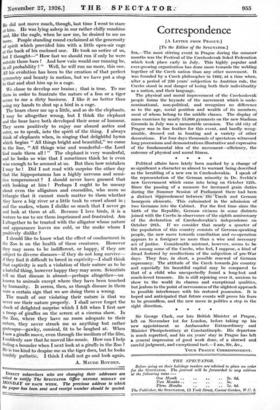Correspondence
[A LEL LER FROM PRAGUE.]
[To the Editor of the SPECTATOR.]
Sni,—The most stirring event in Prague during the summer months was the Festival of the Czechoslovak Sokol Federation which took place early in July. This highly popular and ever-growing organization has done more towards the welding together of the Czech nation than any other movement. It was founded by a Czech philosopher in 1862, at a time when, after a period of 250 years' subjection to Austrian rule, the Czechs stood in real danger of losing both their individuality as a nation, and their language. The physical and moral improvement of the tzechoslovak people forms the keynote of the movement which is unde- nominational, non-political, and recognizes no difference as to the age, social position and wealth of its members, most of whom belong to the middle classes. The display of mass exercises by nearly 15,000 gymnasts on the new Stadium Grounds in July was a memorable occasion. The old city of Prague was in fine feather for this event, and hardly recog- nizable, dressed out in bunting and a variety of other decorations. For four days thousands of spectators witnessed long processions and demonstrations illustrative and expressive of the fundamental idea of the movement—efficiency, the outcome of physical and moral fitness.
* *
Political affairs have lately been marked by a change of so significant a character as almost to warrant being described as the heralding of a new era in Czechoslovakia. I speak of the representation of the German minority in Dr. Svehla's new Government which came into being on October 12th. Since the passing of a measure for increased grain duties during the Summer Session of Parliament there had been a distinct riipprochement between"ItiPICzech and German bourgeois elements. This culminated 'in the admission of two Germans into the Cabinet. For the first time since the birth of the Republic, German citizens in some districts joined with the Czechs. in observance of the eighth anniversary of the declaration of Czechoslovakia's independence on October 28th. If we consider that nearly a quarter of the population of this country consists of German-speaking people, the new move towards conciliation and co-operation appears to a foreigner no more than a wise and necessary act of justice. Considerable mistrust, however, seems to be felt among some of the Czechs, who feel, I suppose, a kind of dread fostered by recollections of the subjection of pre-War days. They fear, in short, a possible renewal of German supremacy. The attitude of the Czech towards jiis country, and especially his beautiful capital may be compared to that of a child who unexpectedly found a long-lost and much-loved treasure. He is still rejoicing over it, anxious to show to the world its charms and exceptional qualities, but jealous to the point of nervousness of the slightest approach to possible interference with his restored possession. It is hoped and anticipated that future events will prove his fears to be groundless, and the new move in politics a step in the
right direction. sic
Sir George Clark, our late British Minister at Prague, left on November 1st for London, before taking up his new appointment as Ambassador Extraordinary and Minister Plenipotentiary at Constantinople. His departure is much regretted, and his six years' stay in Prague has left a general impression of good work done, of a shrewd and careful judgment, and exceptional tact.—I am, Sir, &e.,
YOUR PRAGUE CORRESPONDENT.


















































 Previous page
Previous page